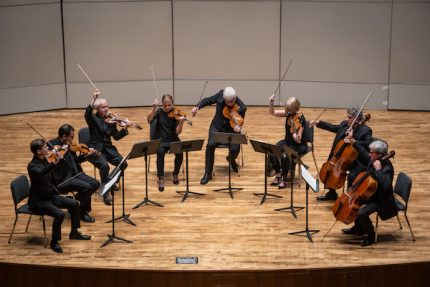Academy Chamber Ensemble triumphs in UChicago Presents opener

Four years ago travel delays nearly caused the touring Academy of St. Martin in the Fields Chamber Ensemble to miss its engagement to raise the curtain on UChicago Presents’ 72nd season.
While there was no such suspense at Mandel Hall on Friday night when the consort returned to do the same honors for the 76th season of the Hyde Park series, the performance was at the same superlatively high level as their last appearance.
The storied Academy was founded in 1958 by Sir Neville Marriner, and under his leadership quickly developed a reputation as one of the world’s finest chamber orchestras. The Chamber Ensemble came into being in 1967, drawing its membership from the Academy’s front desk players with the aim of performing large-scale chamber works. Ad hoc artistic rosters are often assembled for performances of this repertoire, and the Chamber Ensemble was a singular opportunity for Academy colleagues intimately familiar with each other’s playing to offer such scores.
Ensemble coherence and unity were on display throughout Friday’s performance, the highlight of which was Mendelssohn’s timeless Octet in E-flat Major, Op. 20. As a poet, watercolorist, and fencer, to say nothing of his prowess at the piano and prodigious genius as a composer, Mendelssohn may have been the most cultivated man in Europe. He penned the Octet at the age of 16, and had he written nothing after would probably still be remembered as one of the nineteenth century’s greatest composers.
The Academy Chamber Ensemble’s rendition made this familiar opus sound remarkably fresh and spirited. In a score so infused with joyous élan, this isn’t necessarily hard to do, but the players’ attention to detail Friday night elevated their reading to rarified status.
The expansive opening Allegro con fuoco was vigorous throughout, yet also elegantly inflected and well paced, never descending into the generalized sawing that can typify lesser renditions. The darkly hued Andante felt reflective and inward, and the fleet Scherzo was beguilingly fey, its final rising decrescendo evaporating into thin air. The closing Presto was propelled with collective virtuosity, Mendelssohn’s fugal retooling of the line “And he shall reign” from Handel’s “Hallelujah Chorus” feeling as spiritually emphatic as the original. First violinist and Academy concertmaster Tomo Keller was a first among equals, providing gleaming tone and subtle leadership.
The program opened with another octet, but one of much more recent vintage: Sally Beamish’s Partita, written for the Academy and premiered just last week on their tour stop in Columbus, Georgia. The three-movement work channels the composer’s experience at this year’s Carl Nielsen Violin Competition, where she was a juror and heard dozens of solo Bach performances from the entrants. Aside from drawing melodic cells from Bach, this influence isn’t immediately clear, though the work is surely crafted.
The opening Prelude begins with hushed skittering before giving itself over to an insistent ostinato. The ensuing Fugue also takes “And he shall reign” as its theme, though greatly slowed down and harmonically elaborated. This movement churns and evolves, while maintaining a largely ethereal texture among the eight players. The final Chaconne is sharply angular and brings the 12-minute work to an effective conclusion. The Academy players’ remarkably taut, stop-and-start playing was more memorable than the score itself, though the latter might benefit from multiple hearings.
The program was filled out with another teenage opus from a child prodigy: Erich Wolfgang Korngold’s String Sextet in D Major, Op. 10. Korngold began this work at the age of 17 on the eve of the First World War, finishing it two years later. Hearing the work elicits a poignant nostalgia for a world rapidly ending in flames.
The initial Moderato-Allegro is in an updated Brahmsian idiom, vehement, ardent, and harmonically complex. The Andante is largely plaintive, though like much of the music of his fellow Viennese Schubert, the exact musical affects are hard to pin down. At the same moment and in the same city Freud was enshrining ambivalence as a central feature of the psyche, and this felt like a musical parallel to that intellectual trend.
The Intermezzo anticipates Der Rosenkavalier in its troubled evocation of Vienna, and the Finale was simultaneously exuberant and reflective. The Academy players persuasively broadcast all these elements, in a memorable delivery of this autumnal music, remarkable for having come from an adolescent’s pen.
The opening weekend of UChicago Presents’ 76th season continues Saturday night with Third Coast Percussion at the Logan Center. The Grammy-winning local quartet will perform works of Peter Martin, Alex Lunsqui, and Ayanna Woods, along with world premieres Rodrigo Bussad and Georg Friedrich Haas. chicagopresents.uchicago.edu/
Posted in Performances


